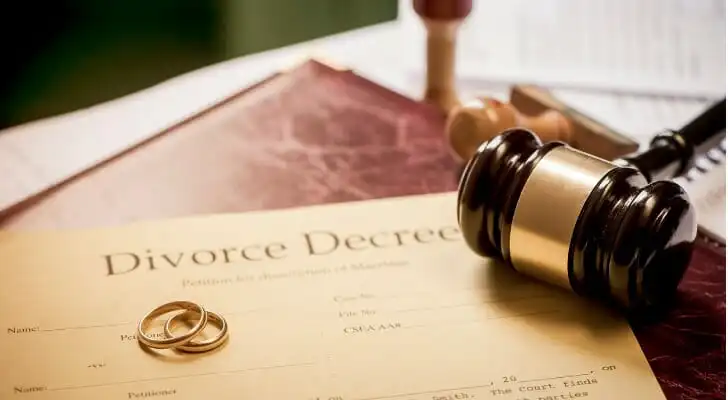Divorce is rarely simple, and it can be helpful to understand your state’s divorce laws before beginning the process. To file for divorce in Illinois, you must meet specific eligibility requirements. When it comes to dividing assets, Illinois courts follow an equitable distribution model, meaning property is divided fairly, though not always equally. While divorce can be emotionally taxing, it doesn’t have to derail your finances. You can consult with a financial advisor to walk you through the financial aspects of divorce.
How to File for Divorce in Illinois
Illinois law provides for a no-fault divorce system, emphasizing irreconcilable differences as the sole ground for dissolution. This aims to simplify proceedings and reduce conflict between parties.
The following are some of the things to keep in mind if you file for divorce in Illinois.
Eligibility
To file for divorce in Illinois, at least one spouse must have resided in the state for a minimum of 90 days prior to filing. The divorce petition should be submitted to the circuit court in the county where either spouse resides. This residency requirement ensures that the Illinois courts have jurisdiction over the case.
Grounds for Divorce in Illinois
Illinois operates under a no-fault divorce system, meaning that the only ground required is “irreconcilable differences.” This term means that the marriage has broken down beyond repair. It’s assumed that couples meet this requirement if they’ve lived separately for at least six months prior to filing. This separation can occur while still residing in the same household, as long as marital relations have ceased.
Process for a Divorce
Once the residency requirement is met and irreconcilable differences are established, the following steps are involved in the divorce process:
- Filing the petition: The spouse initiating the divorce (plaintiff) files a Petition for Dissolution of Marriage with the appropriate circuit court.
- Serving the petition: The petition must be formally delivered to the other spouse (defendant), who then has 30 days to respond.
- Negotiation and settlement: Both parties work to resolve issues such as property division, spousal support and, if applicable, child custody and support. This can be achieved through mutual agreement or mediation.
- Court proceedings: If an agreement is reached, the court reviews and approves it. If disputes remain, the court will hold hearings to make determinations based on the best interests of all parties involved.
You may want to consult with a qualified family law attorney to assist with the process, or with a financial advisor, who can help you manage the financial impacts of a divorce.
How to Split Up Assets During a Divorce in Illinois
Under Illinois divorce laws, both financial and physical assets — such as investment accounts, real estate and personal property — are subject to division during divorce proceedings. Before dividing these assets, the court must first determine whether each item qualifies as marital property or separate property.
Here’s how marital property vs. separate property is typically categorized:
- Marital property: This generally includes all assets and income acquired by either spouse during the marriage. This can include wages, real estate, retirement accounts and jointly purchased items.
- Separate property: Assets acquired before the marriage, as well as gifts or inheritances received individually during the marriage. These assets are typically not subject to division, unless they are commingled.
It’s important to remember that separate property can become marital property if it’s mixed with joint assets. For example, if one spouse deposits inherited funds into a joint bank account, those funds may be considered marital property by the court.
Once the court identifies and separates marital property from separate property, a judge will divide the marital property using equitable distribution.
Equitable distribution means a fair division of assets, not necessarily a 50/50 split.
The judge considers several factors when deciding how to divide property, including:
- The contribution of each spouse to acquiring or increasing the value of marital property
- The length of the marriage
- The financial situation and earning potential of each spouse
Illinois law does not consider marital misconduct, such as adultery or betrayal, in the asset division process. Even if one spouse was unfaithful, this does not entitle the other to a greater share of the property.
How to Divide Property in Illinois After Divorce

Just like financial assets, physical marital property, such as real estate, vehicles and household items, is divided by a judge according to Illinois’ equitable distribution laws. This means the court aims for a fair division, not necessarily an equal one.
Factors the Court Considers
When determining how to divide physical marital property, the judge will evaluate several factors, including:
- Each spouse’s contribution to acquiring the property
- Each spouse’s role in increasing or decreasing the value of the property
- The economic resources of both spouses
- Age and health of each spouse
- Vocational skills and employability of each spouse
- The projected financial situation of each spouse after the divorce
- Each spouse’s ability to acquire future assets or income
- Any rights a spouse may have from a prior marriage
The court pays close attention to each party’s economic condition. In some cases, the lower-earning spouse may be awarded a greater share of marital assets, such as bank accounts or investment funds, to ensure a more balanced financial outcome.
How to Manage Child Support and Alimony Under Illinois Divorce Laws
Illinois law defines a child as anyone under the age of 18 or anyone under the age of 19 who is still attending high school.
Under Illinois divorce laws, a custodial parent may receive child support from the other parent. Illinois supports a Flat Percentage of Income Model when determining payment amounts. The formula generally disregards the custodial parent’s income. Instead, it’s calculated using the other parent’s net income minus certain deductions, including the following:
- Federal and Illinois income taxes
- FICA Payments (Including Social Security)
- Mandatory retirement contributions
- Health and hospitalization premiums for self and dependent
The statute defines the percentage taken out of net income as defined above. The rates are as follows:
- 20% for one child
- 28% for two children
- 32% for three children
- 40% for four children
- 45% for five children
- 50% for six or more children
The court will enforce these rules unless it finds they would be inappropriate after accounting for the best interest of the child.
Divorce laws in Illinois allow either party to receive alimony payments, spousal support, or maintenance payments. The court determines the amount of alimony as well as the duration based on numerous factors. Fault and marital misconduct are not among them. However, the following are some of the points the court may consider:
- All financial resources including property granted to either spouse following divorce proceedings
- Financial needs of both parties
- Earning capacity of either spouse
- Time it can take for either spouse to become self supporting (court may waive this factor for a custodial spouse)
- Physical, mental and emotional condition of each spouse
- Tax impact on each spouse following division of marital property
- Any other factor the court deems fair
In addition, a spouse can request temporary alimony as the divorce remains pending. Both spouses can agree on an amount, or the court can make that decision. This alimony typically ends once the judge issues a final judgement on the divorce.
Nonetheless, the court expects the alimony recipient to make reasonable efforts to become self-supporting. In certain cases, however, a judge can make alimony payments permanent if the recipient can prove they have a permanent inability to become self-supporting.
401(k) and IRA Plans and Divorce in Illinois
Generally speaking, a judge treats retirement plan assets as any other type of property under Illinois divorce laws. But there are some things you should know about splitting up a 401(k) in a divorce.
First, the judge will determine which portion of the plan assets is marital property. In a general sense, the court defines the dollar amount of a retirement account accumulated between the marriage and divorce as marital property. It defines the dollar amount accumulated before the date of the marriage as private property.
Moving forward, the court will consider many of the same factors mentioned above when deciding how these financial assets should be divided. In the case of a 401(k), the judge would issue a qualified domestic relation order (QDRO) to the plan administrator(s).
This document details how the account would be divided and by what means. In this case, you may be better off if the shares are stated as percentages instead of dollar amounts. This approach may protect either spouse during major market swings.
But keep in mind that some plan administrators may have their own rules dictating how they move money around in a qualified plan in order to comply with stringent federal regulations. The court usually issues QDROs after finalizing the divorce.
But you want to make sure this is the case. Any movement of funds from a retirement plan like a 401(k) or even an individual retirement account (IRA) before the account holder reaches age 59 ½ may leave him or her open to serious tax penalties.
Moving forward, recipients of funds have a few choices when it comes to taking their shares from a 401(k). The QDRO may direct immediate distribution. In this scenario, neither spouse would owe the 10% early withdrawal penalty if one applies at all. However, recipients would owe regular income tax on the amount they receive. This may not apply when dealing with a Roth 401(k). Both spouses can avoid either type of tax by setting up 401(k) rollovers into their own accounts.
The process for dividing an IRA is a bit different. A QDRO does not apply when dividing IRA assets. However, the couple should wait until the judge finalizes the divorce to avoid penalties and taxes. A divorce decree can be sent to the IRA administrator, indicating how the assets in the account should be split up. Either party would also benefit from transferring the right share directly to a personal IRA. This is known as a trustee-to-trustee transfer. This would steer both parties clear of potential penalties and taxes.
Splitting retirement plan assets can be particularly complicated, especially when you consider potential tax consequences and the true value of retirement savings. When analyzing these situations, it’s important for either spouse to find a financial advisor and divorce lawyer who can offer the guidance necessary to make this process run as smoothly as possible.
Divorce and Estate Planning in Illinois
Under Illinois divorce laws when it comes to Illinois estate planning, the surviving spouse loses all rights to property designated in the will of his or her deceased ex. However, this statute applies only after divorce is finalized. What happens when a spouse dies as divorce proceedings are underway?
Generally speaking, the surviving spouse would still lay claim to property as designated in the will of the deceased. This is why it’s important to update your will and estate planning strategy in the midst of divorce proceedings. Qualified financial advisors and estate planning lawyers can serve as crucial guides here, especially if the divorce involves a large estate.
But if an Illinois spouse with children dies intestate, meaning without a will, the descendants would divide the estate of the deceased. This becomes ever more complex if the children were minors at the time of the parent’s death. In this case, a legal guardian would manage the inheritance. In case of a divorce, this usually means the surviving ex-spouse becomes the legal guardian. If the deceased spouse had no children, the ex-spouse essentially receives the entire estate.
One way to safeguard against this scenario is to establish a revocable living trust. As with any Illinois living trust, you establish this document in your lifetime and it dictates what happens to your assets and property when you die. Courts divide property in most divorce cases. But a spouse can still keep an ex from touching what’s left in his or her share after death. A revocable living trust allows individuals to change beneficiaries and trust provisions at any time. So both spouses may want to get their pens busy as the divorce proceedings take place.
Bottom Line

Illinois divorce laws can be complex, so it’s important for either party to brush up on key details. These include eligibility to file for divorce and what the proceedings would look like. It’s also essential to know what marital property is under law and how such property may be divided among spouses. Keep in mind the rules about how property including retirement plan assets are divided. Child support and alimony may also play a role, but it doesn’t have to be permanent. And spouses can still protect their estates from exes in the event of death.
Tips on Protecting Your Finances During a Divorce
- Divorce can be a grueling time for all parties involved, but it doesn’t have to be a financial one. For instance, you could seek the help of a qualified Illinois divorce lawyer or a financial advisor. Finding a qualified financial advisor doesn’t have to be hard. SmartAsset’s free tool matches you with financial advisors who serve your area, and you can interview your advisor matches at no cost to decide which one is right for you. If you’re ready to find an advisor who can help you achieve your financial goals, get started now.
- After the smoke clears, your finances may still be vulnerable to the aftermath of the divorce. To make sure you’re prepared, you can review our report on 5 steps to repair credit after a divorce.
- Check out our report on ways to protect your retirement savings after a divorce for more tactics you can use to safeguard your investments.
Photo credit: ©iStock.com/FabioBalbi, ©iStock.com/AndreyPopov, ©iStock.com/Jirapong Manustrong
